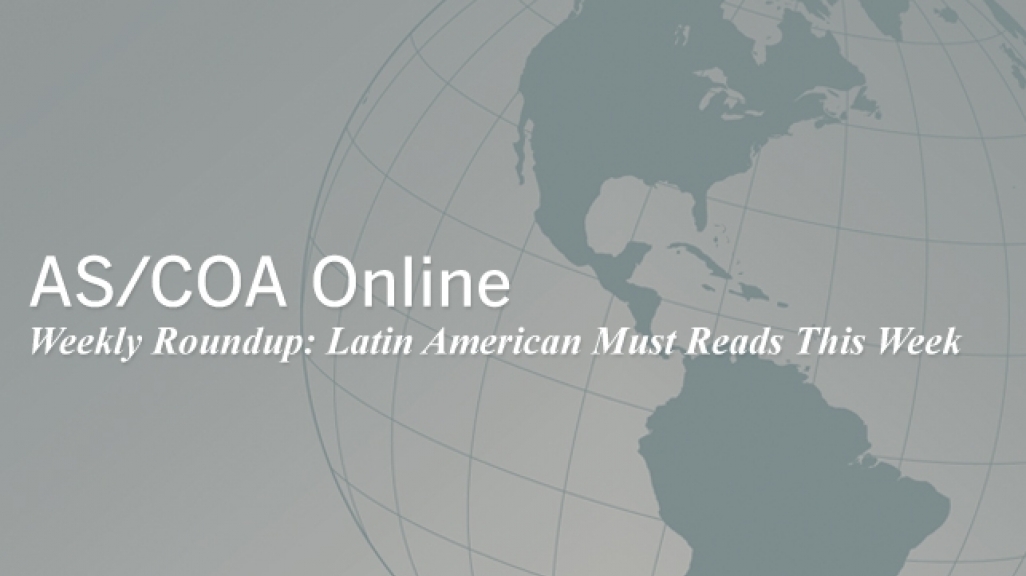Weekly Roundup: Mexico's Energy Reform, BRICS Summit, Colombia's Peace Talks
Weekly Roundup: Mexico's Energy Reform, BRICS Summit, Colombia's Peace Talks
Brazil's World Cup sets records, the Honduran president calls for aid to address the child migrant crisis, and Ecuador constructs a high-tech city from scratch. Read these stories and more.
Mexico energy bill moves ahead in the Senate. On July 18, Mexico's Senate gave general approval to a hydrocarbons bill to open the country's oil and gas sector to private investment. The bill forms part of a secondary legislation package to implement energy reform approved last year. However, senators must still decide on a number of articles to give final approval to the hydrocarbons legislation. Legislators who oppose the energy reform want to put it up for a popular vote as a referendum in 2015. Three other energy bills await approval by the Senate.
Get the background on Mexico’s energy sector in an AS/COA Online infographic.
BRICS leaders launch bank, meet with Latin American counterparts in Brazil. This week, heads of states from the BRICS countries (Brazil, China, India, Russia, and South Africa) met in Fortaleza, Brazil, where they signed agreements to found a development bank and a joint currency reserve pool. Following the summit, BRICS leaders met with presidents of the Union of South American Nations, as well as leaders from the Community of Latin American and Caribbean States. Brazilian President Dilma Rousseff and Chinese President Xi Jinping also signed accords as China purchased 60 Embraer jets and extended a $5 billion credit line to Brazilian mining company Vale.
Understand how the BRICS have evolved in an AS/COA Online explainer.
Honduras president suggests aid to address child migrant crisis. On July 13, Honduran President Juan Orlando Hernández met with seven U.S. legislators and proposed an aid program for security that would resemble Plan Colombia. The funding would “get to the root of the problem…fueling migration,” said Honduran Finance Minister Mireya Aguero. Many of the 57,000 unaccompanied children apprehended at the U.S. border since October hail from Honduras.
Find out why the migrant crisis affects cities beyond the U.S. border.
The latest phase of Colombia’s peace talks begins. On July 15, Colombian government negotiators met with delegates of the Armed Revolutionary Forces of Colombia (FARC) in Havana, Cuba, to resume peace negotiations. As the next round of agreements will focus on reparation for victims and disarmament, negotiators confirmed this week that 15 delegates from a coordinating organization for victims will travel to Havana on August 16. A June Gallup survey found that 72 percent of Colombians support the talks—an eight-point increase from the previous month.
Learn what role Colombia’s new legislators will play in the peace process.
Tourists and tweets: Brazil’s World Cup by the numbers. Brazil didn’t win the World Cup, but 95 percent of foreign tourists who visited the country say they want to come back, according to a Datafolha survey. The country’s tourism agency reported that 1 million foreigners visited the country during the mega-event, which added over $13 billion to the Brazilian economy. From June 10 to July 10, 15.3 million travelers passed through 21 airports, with only 7.3 percent of flights delayed. Also, social media played a big role during the tournament, with 672 million World Cup tweets sent. Brazil’s defeat in the semi-finals was the most tweeted single event in history, with 35.6 million tweets.
See even more numbers on Brazil’s World Cup in an AS/COA Online infographic.
Ecuador plans a high-tech city from scratch. Ecuador plans to invest over $1 billion to build the high-tech city of Yachay, referred to as the “Moon Shot” by President Rafael Correa. Currently in the early stages of construction, the city will contain a research university, industrial parks, and laboratories, reports The Miami Herald. The city will aim to attract start-ups and tech companies, and will have a free-trade zone. Yachay’s development is part of a long-term rebranding project for the country. Infolatam reported this week that beginning last year, Ecuador’s government paid a U.S. public relations firm $6.4 million to improve its international image.
Find out how Colombia transformed one of its cities into a tech hub.







